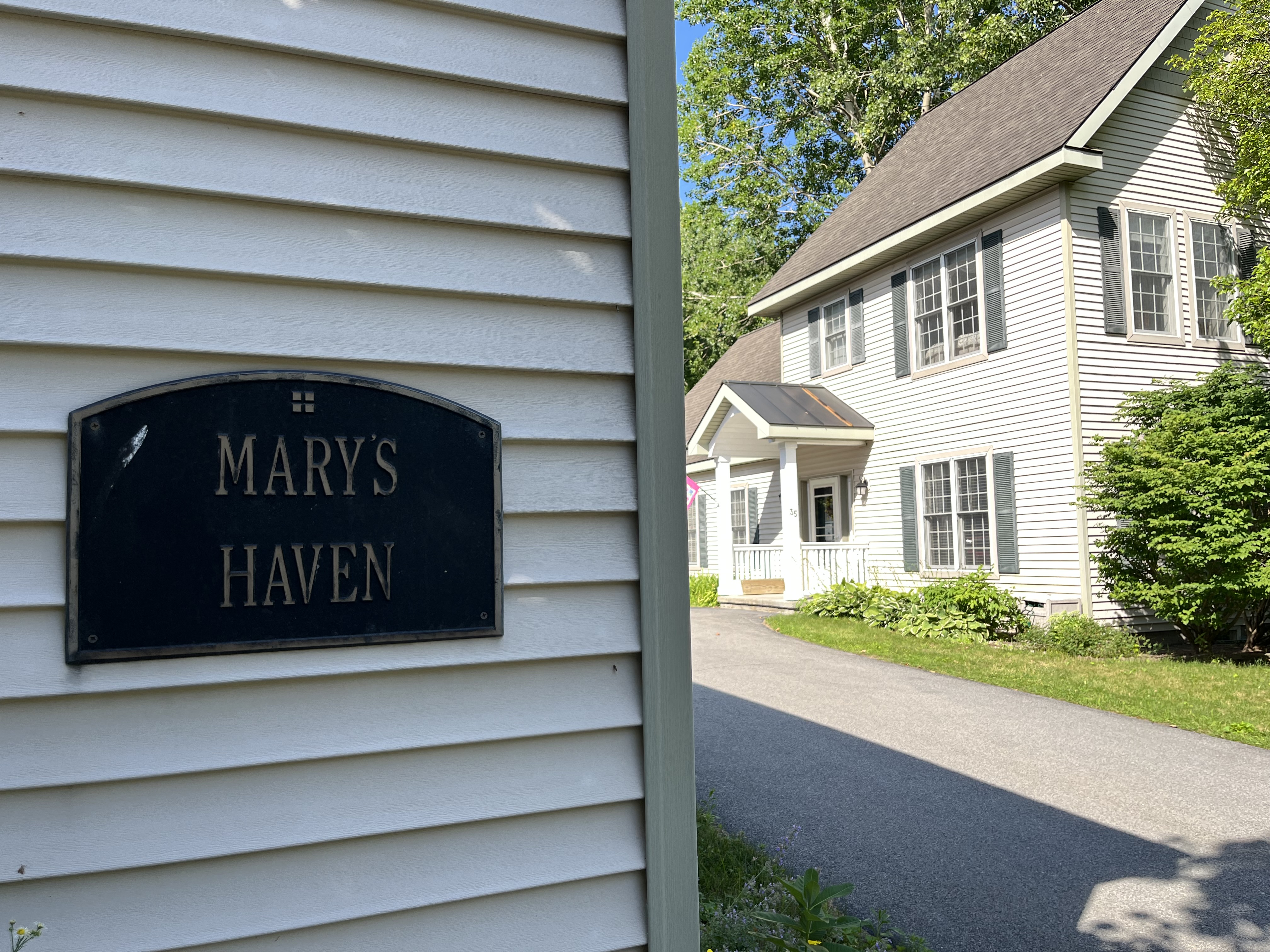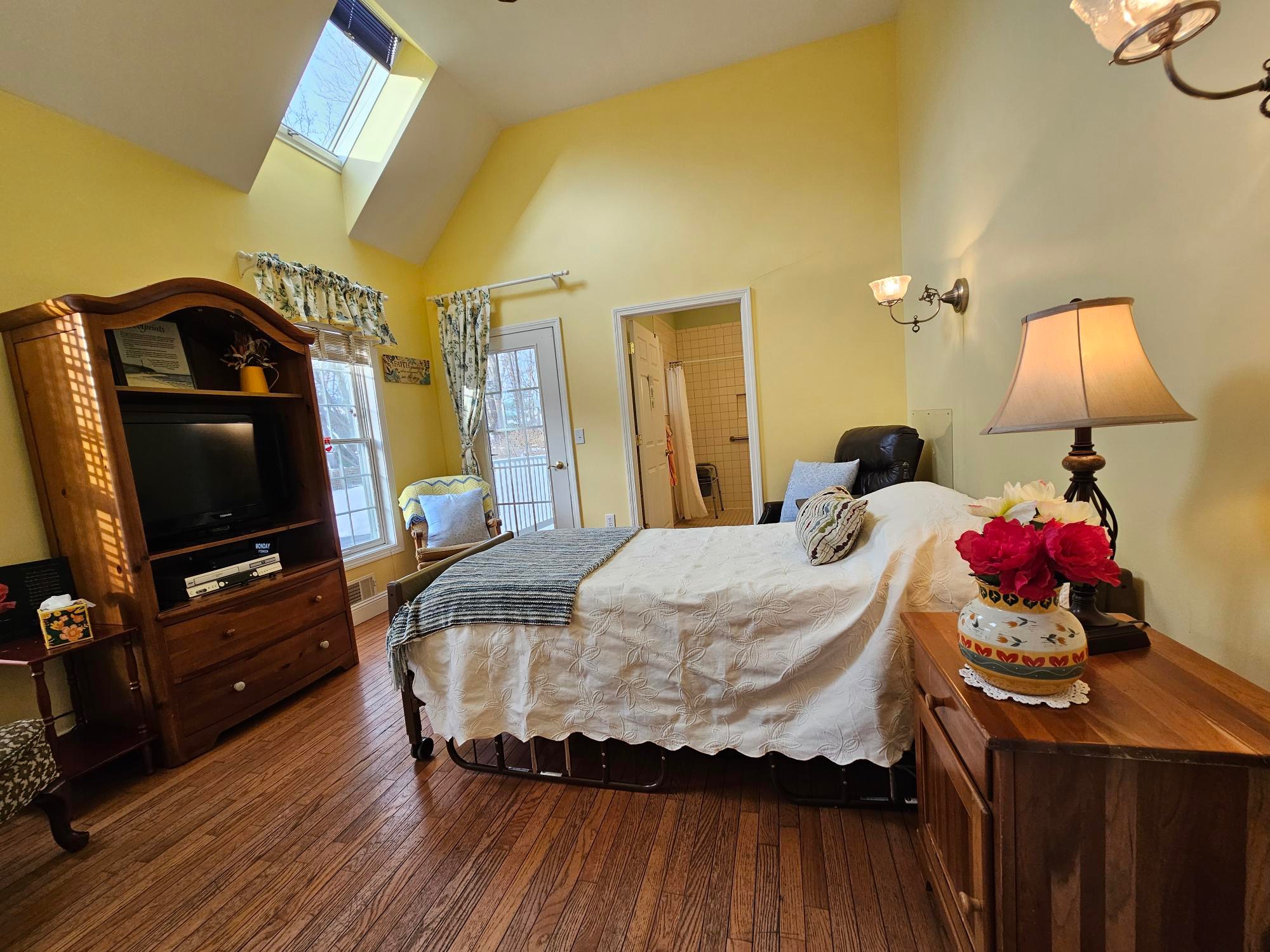July 8, 2025 at 5:45 p.m.
A FINAL HAVEN
A man sits quietly in a chair, cornered in his bedroom. His wife moves slowly around the bedroom, a glow from the afternoon sun cascading through the overhead skylight. Across the room, cards and well wishes for dad and grandpa line the top of a television that sits perpendicular to an outdoor lounge area, facing a lush garden and bird feeder.
It’s a calm and quiet space. The kind of environment you could fall into a deep nap in, whisked away to sleep without even thinking about it.
In a way, this is exactly what the space hopes to do. The man’s room, which was once occupied by others before him, is where he has come to die.
Mary’s Haven, a two-bedroom facility operated by Catholic Charities of Saratoga, Warren and Washington Counties, is a community home for the dying or persons with irreversible illness within the last three months of their lives.
The house offers residents a comfortable place to spend their last few weeks of life, and gives families the opportunity to spend time with their loved ones without worrying about the medical side of their care. As a mission of Catholic Charities, any family who utilizes Mary’s Haven pays nothing for the services.

“Death is a part of what our life is,” said Jolene Munger, executive director for Catholic Charities of Saratoga, Warren and Washington Counties, “and providing that care, it takes a different individual.”
Mary’s Haven opened in 2003 with support from a community hospice grant and with donated time, money and land that came together to bring a vision of a community home for the dying to fruition. The house obtains referrals from local hospice, hospitals, physicians, family and friends, and since opening, has provided end-of-life care for more than 350 residents.
The need for a home for the dying has only grown since. New York State senators passed the Medical Aid in Dying Act in June, which would allow people with terminal illnesses the legal right to end their own lives. While the future of the bill is still unclear — it awaits the signature of Gov. Kathy Hochul who has given no indication where she stands on the bill — it highlights the need for ensuring proper end-of-life care options for families.
“(Mary’s Haven) allows a mental break for the caregiver to be able to say I can just be with my loved one instead of being their caregiver,” Munger said.
“We try to keep their dignity as much as we can for them,” said Lisa Wessell, a volunteer and retired nurse from Ellis Hospital.
“It’s end-of-life care, not continuing life care, but it does not mean we won’t take care of you,” she added. “The basic agreement is that you’ll be here to die, and we’ll do our best to keep you comfortable.”
Wessell (below) has been connected with Mary’s Haven almost since its inception. Over 20 years later, Wessell — along with dozens of dedicated volunteers — is part of the vital backbone of Mary’s Haven. The house is supported entirely by volunteers who staff the facility 24 hours a day and maintain the property and grounds. From caregiving with residents, to grounds maintenance and doing laundry, there are a dozen tasks that are filled each day thanks to those willing to give their time.

Hospice nurses and staff ensure residents are comfortable, providing all medical care. It’s the volunteers who help with “whatever little TLCs” they can, Wessell said.
They make sure residents are clean, giving changes or baths, rotating residents in bed or applying lotion. Wessell will ask if residents want to have their face washed or their hair done for the day. She’ll point to photos of family members if they’ve been brought into the room and ask who they are. Other times, there’s no talking at all, just sitting in the room together so residents aren’t alone, watching TV or enjoying the birds that stop by the feeders.
“If you want me to come in here, I’ll come sit in here,” Wessell said. “I’m trying to treat you like family. You live here; I’m the one who’s actually bothering you. You live here, and I’m here to help you.”
And as much as they can, volunteers bring levity to a hard circumstance. If a resident’s birthday falls during their stay, the house will celebrate it. Wessell recalled one resident who was a huge Yankees fan, and volunteers always sat with her and watched the games. When her birthday came around, the house threw her a Yankee-themed party.
And at the end, family members can know that their loved one was never alone when they passed. Wessell has been in the room a few times when a resident has passed. Afterwards, if the family is present, she’ll ask if she can open the window; a ritual she learned from volunteering at the house to “let the spirit out” of the room.
“I want to be there because, in my own life, I hope I don’t have to die alone,” Wessell said. “I don’t want them to die alone, and this is a way they can have someone holding their hand as they’re going out.”
For more information on volunteering or donating to Mary’s Haven, call the house at (518) 587-5000 or visit www.ccrcda.org/get-help/saratoga-county/community-home-for-the-dying/.
- Archbishop Hebda after Catholic school shooting: We ask for your prayers and action, rooted in hope
- Experts: Churches, schools must act on ‘unique vulnerability’ in their security
- Pope Leo joins US bishops in mourning victims of Catholic school shooting
- Amid nation’s divisions over immigration, church stands as ‘beacon of hope,’ say Iowa bishops
- 10 times Pope Leo has included a St. Augustine quote in his public addresses
- Vatican official warns of AI’s hidden costs to environment, work and society
- Pope sends his condolences after ‘terrible tragedy’ of school shooting
- Hurricane Katrina 20th anniversary a call to racial equity, justice, say bishops
- Pope pleads with Israel and Hamas to end the violence
- Rights experts highlight rising anti-Christian hate crime in Europe









Comments:
You must login to comment.